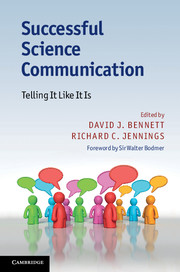Book contents
- Frontmatter
- Contents
- Foreword
- Authors' biographies
- Introduction Public engagement in an evolving science policy landscape
- Part I What it helps to know beforehand
- Part II Policy-makers, the media and public interest organisations
- 8 Research and public communication in EU policy and practice
- 9 Tackling the climate communication challenge
- 10 Dealings with the media
- 11 Dealings with the U.S. media
- 12 Relations with public interest organisations: consumers
- 13 Relations with public interest organisations: patients and families
- 14 Relations with environmental organisations: a very personal story
- Part III What you can do and how to do it
- Part IV And finally, evaluating and embedding science communication
- Index
- Plate section
- References
14 - Relations with environmental organisations: a very personal story
Published online by Cambridge University Press: 05 May 2013
- Frontmatter
- Contents
- Foreword
- Authors' biographies
- Introduction Public engagement in an evolving science policy landscape
- Part I What it helps to know beforehand
- Part II Policy-makers, the media and public interest organisations
- 8 Research and public communication in EU policy and practice
- 9 Tackling the climate communication challenge
- 10 Dealings with the media
- 11 Dealings with the U.S. media
- 12 Relations with public interest organisations: consumers
- 13 Relations with public interest organisations: patients and families
- 14 Relations with environmental organisations: a very personal story
- Part III What you can do and how to do it
- Part IV And finally, evaluating and embedding science communication
- Index
- Plate section
- References
Summary
Student years
I was born in the Netherlands at the end of the 1950s in a society when many people were working hard to rebuild a society destroyed by war and fascism. As a future citizen I grew up in a world dominated by a ‘cold war’ between capitalism in the West and communism in the East. While in the 1960s they agreed a ‘peaceful coexistence’, liberation wars raged in former colonies of industrial nations, which later became generally known as ‘developing countries’, often characterised by hunger and violence. But our own society was affluent. Even the sky was not the limit, as I saw men walking on the moon for the first time. In the 1970s I went to secondary school where I discovered that I liked biology, physics, chemistry and history. I was also eager to learn foreign languages such as English, German, French and Spanish. I further remember reading a pocket book from my parents' shelves; the report from the Club of Rome on the future depletion of Planet Earth's resources of raw materials (Meadows et al. 1972). For the first time, because of the environment, there seemed to be limits to (economic) growth. Although the Club of Rome report has often been reviled because of some of its incorrect predictions, its gloomy message was largely supported by the Millennium Ecosystem Assessment launched by the United Nations in 2001 (Millennium Ecosystem Assessment 2005).
At the end of the 1970s I left my home town and started my studies at the Agricultural University in Wageningen in the Netherlands. There I was trained and examined in the prevailing techno-scientific paradigm for ‘modern’ agriculture and food production. More specifically, I studied the biological orientation of molecular sciences with courses like genetics, microbiology, plant physiology, biochemistry and molecular biology. But, in contrast to most fellow students in molecular sciences, I also followed many courses in philosophy of science, and science and society. Moreover, I could not avoid being influenced by alternative streams in society such as environmental, peace, women's, Third World and squatting movements. These movements held emancipation and democracy in high regard. The ideal of people who are autonomous in creating their own lifestyle, as well as solidarity with people who are less well off, appealed to me. I also wished to be ‘critical’ and participated in many debates about world hunger, alternative agriculture and criticism of technocracy. In the 1980s I saw how a neo-conservative restoration was shaped through neoliberal ‘no nonsense’ politics aimed at the privatisation of many public utility services. In that period political governance and decision-making started moving more and more to the European Commission and the European Parliament in Brussels and Strasbourg, while international trade agreements started having increasing impacts.
- Type
- Chapter
- Information
- Successful Science CommunicationTelling It Like It Is, pp. 204 - 220Publisher: Cambridge University PressPrint publication year: 2011



